When the COVID-19 pandemic was declared in March 2020, full-time missionary work around the world changed immediately and dramatically. Sister missionaries, Jade Hansen, Brynn Lee, and Tressa Alexander, from the Massachusetts Boston Mission, shared their experiences of serving while under quarantine.
When did you decide to serve a mission?
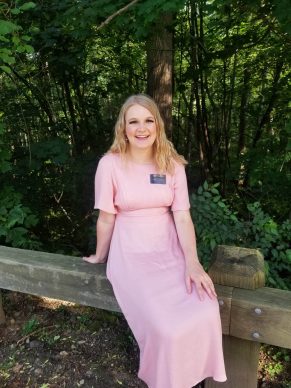
Sister Jade Hansen
SISTER HANSEN: Growing up, it was something that I always wanted to do. When I was a sophomore in high school, I started a missionary preparation class. It helped me gain a testimony of the importance of missionary work and I wanted to share the joy that the gospel has brought to me. I continued to build my relationship with God, and study the scriptures, and focus so I could be the best missionary possible. I had a lot of opportunities after high school and had to put everything on hold to serve, so I prayed a lot about the decision to go. It felt like the right thing to do.
SISTER LEE: I decided to serve a mission when I was twelve years old. I remember preparing to go, always having that in my sights. As COVID started happening, people asked, “Are you still going to go on a mission?” I distinctly received the revelation that there’s no greater time to serve than now because people need to know of God’s love for them, because we are in this turmoil. I started my mission in January 2021.
My call was to the Philippines Cebu Mission. I was about three weeks into the MTC when I got a call from my stake president that I’d been temporarily reassigned to Boston Massachusetts. I never thought I’d be here, I honestly thought I was going to the Philippines. I’d been in contact with missionaries there and they said it looked like things were going to open up, and I’d be able to go. Obviously, things happened and virus numbers went up. I’ve been in the Boston Mission for half my time already, but I love it here.
SISTER ALEXANDER: I always wanted to go on a mission and I was really inspired by women who served missions. I was preparing to leave in spring 2021, and my call was to Boston. In Utah, it seemed like the pandemic was clearing up quickly. I know this sounds so selfish, but I was worried about going “back in time” to a lot of quarantine restrictions. I said, “Heavenly Father, I don’t really want to do a COVID mission, but I’ll do what You want me to do because this is Your work, not mine.” The desire to serve stayed consistent for me, and I thought, “Okay, maybe it’s just going to be different. But I know I need to go.”
What was your Missionary Training Center experience?
SISTER HANSEN: I went to the Provo MTC in December 2019. It was closed off from the world – you’re with your district members, you’re in devotionals and classes all day with just breaks for meals and exercise. It was really cool being in such a spiritual environment, surrounded by people who are working together to prepare for missions and share experiences. It was a really good support system to get over the stress and nervousness of going on a mission.
I loved the MTC. It was such a pivotal moment for me that I’m sad for those who don’t get to experience it in that way. There’s the home MTC program now, which is a completely different experience. Some people do really well with it, but I need interaction with people. I’m so thankful the timing worked out because if I had left a few weeks later, I wouldn’t have had those experiences and made those friendships.
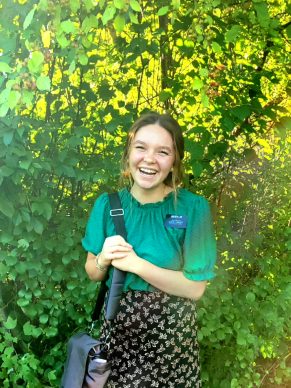
Sister Brynn Lee
SISTER LEE: I did the MTC online. I personally loved the home MTC, because I shared the spiritual experiences with my family. They got to be a part of that. It was nice, after being on the computer for nine or ten hours, to debrief with them and talk about everything I’d learned. There is a spirit when you have a missionary in the home.
The hardest part about it was being alone as a missionary. We were living in an area where there aren’t many members of the Church, so I got interesting looks when I went out. When I visited my grandma in Spanish Fork, Utah, people got excited – “You’re a missionary! You’re probably doing the home MTC.” At home, I felt alone and vulnerable. But I loved home MTC, and I absolutely believe you can feel the Spirit over the internet.
SISTER ALEXANDER: I also did the MTC all online. It was a struggle because I’m the oldest of seven kids, and we live at my grandparents’ house. The rooms are all connected unless it’s a bedroom with a door. You can hear something from anywhere in the house, so it’s really, really loud. The neighbors said I could do my MTC studying at their house, and I was there for a couple of days but it felt wrong. So many people talked about blessings that came from being in their home and sharing with their families, and I wasn’t sharing it with my family. So even though it’s really loud, I needed to be there – God wanted me to have that sacred experience of the MTC with my family and take advantage of it instead of trying to avoid it. Focusing was hard, but I was surprised at how much more I felt the Spirit at home than at the neighbor’s.
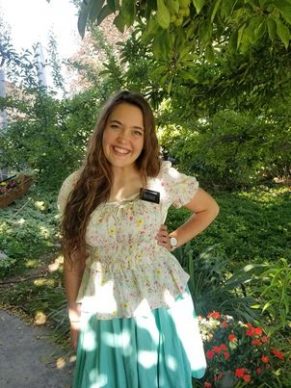
Sister Tressa Alexander
I had toured the MTC in Provo when they did a lot of remodeling and had an open house. I felt the Spirit stronger than I’d even felt it in the temple. I thought, “WHOA. I need to be here!” My call said that I was going to the in-person MTC in Provo, and I was so excited! I wasn’t surprised to get an email changing to home MTC, but it was still frustrating.
In the dedicatory prayer of the MTC, they gave a blessing for the spirit of the MTC to go with the missionaries wherever they are. I found that fascinating. It was so cool that the Spirit I had felt so strongly in that place was also in my home. I had no idea this was possible. The Lord will go where His people are.
What happened in spring 2020 for the Boston missionaries when the entire world went into the pandemic lockdown?
SISTER HANSEN: In February, we thought COVID was blown out of proportion. My companion and I were visiting a member in March when we got a text from mission leadership to go get two weeks’ worth of food, right now, and they’d given us extra money. We went to the store and it was like Black Friday, but worse. We wondered what was happening. The next day, we were visiting another member when we got another text that told us to go to the apartment immediately and stay inside for two weeks.
We were kind of excited, to be honest. My companion and I went to the church and got all the animated Bible videos to watch, and it was going to be a party. We weren’t allowed to see anyone in person – no members, no people we were teaching, not even other missionaries.
Then that two weeks just kind of continued. It was a month, and we still couldn’t see anyone at all in person. The members weren’t allowed to bring us food, even to leave it on the porch. Church was shut down and everything was really closed. It was so weird because as missionaries, we weren’t getting a lot of information so there was a lot of wondering and speculating. It was hard that we couldn’t fulfill our purpose as missionaries. Time went on and COVID kept going.
Eventually, things relaxed a little bit during the summer, with limited church meetings starting in July 2020. So four months of total lockdown. It all got shut down again during the winter. Near the end of my mission, after a full year under tight restrictions, things started to open up more. That was good.
So basically, you spent your entire mission in your apartment.
SISTER HANSEN: Pretty much. It was just my companion and me, that’s it. She was one of my favorite companions, thankfully. I was very glad to be in those first few weeks of isolation with someone I got along with well. For the first two months of the lockdown, we weren’t allowed to see anyone at all, including other missionaries. We did not even get the sacrament ordinance at our apartment, which was hard. The Elders could do it for themselves, but obviously, we could not. So we went a couple of months without the sacrament, which was so sad. I was really thankful when a member eventually brought us the sacrament.
The work during the lockdown was all online. There was nothing in person. It was weird. It was hard because no one expected it. If I had known that’s what my mission would have been like, I think it would have been easier. But I was expecting to be out and talking to people all the time. So those first few months were especially hard. You’re with just one person, your companion, and we couldn’t see people at all.
How did you do missionary work from an apartment?
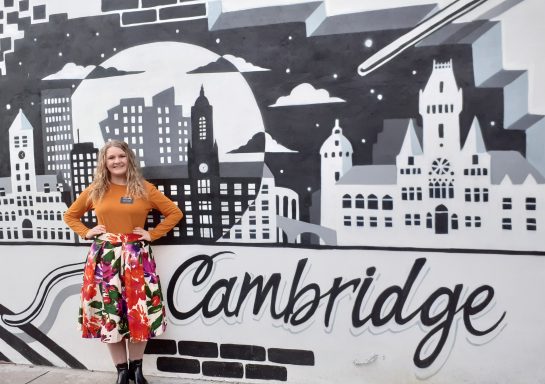
Sister Jade Hansen
SISTER HANSEN: At first, we just called people in the area book, which is the guidebook with contact information for members and nonmembers who have previously been taught. We’d go through the area book and take two breaks in the day. That was all we did. Calling people wasn’t effective. They wouldn’t answer or they weren’t interested. We had to come up with stuff to do before the leaders figured out all the online things on Zoom and social media.
We didn’t start Zoom meetings or Facebook finding or online conversations for at least a month. That was a huge step up because we could actually see people! Facebook pages were created for the areas. Every week, we made a specific video. We tried to be creative with it. We made a video that was a car wash and talked about washing off the sins of the world. Such a meme.
I’d seen some funny missionary videos here and there before the mission and thought they were cool, but as a regular missionary before COVID, we didn’t have time for that. We were told not to be on social media because it was a distraction. It was definitely a different environment that leaders then wanted us to put ourselves out there and make videos to post on social media.
We really had to use our creativity in coming up with video ideas that we could relate to gospel principles, and be relatable to other people. My favorite thing was making videos called “Christ is the Way.” We made a Facebook story for 26 seconds. We did a skit and read a scripture, and talked about how we can apply those things. It was really fun. It made missionary work enjoyable and we had a lot of success. We grew a lot in video-making skills and sharing our testimonies in other ways than just talking in a lesson.
We were thankful when things started to open up in July 2020 and we went back to church in small group sacrament meetings (25 people or less), and we could at least go outside. We could leave stuff on members’ doorsteps, as long as there was no contact. We could have district meetings in person. We could meet members outside only at the church but not for meals or lessons, and always with masks.
New England is a strict place, and the mission authorities were very conservative in their approach to the pandemic – they did not want to take any chances so they were very strict about us not seeing people. That was hard, and annoying, because in other parts of the United States, the missionaries were never restricted from visiting the members’ homes. I wish it had been consistent for everyone. My parents would video call and the missionaries were at my house. But it was over a year before we could go to any members’ homes to visit with them, even outside. I never again went inside someone’s home from the time the pandemic started until I finished my mission and went home. That was so sad.
Some of my friends say that the pandemic wasn’t that bad. Well, they had contact with people through the whole thing and that support on their missions. I heard, “We went tracting today!” You what? I was frustrated that other missions kept going like nothing happened, and we were still hoping to go back to normal. I stopped reading my friends’ emails.
The Church and the missionary work never fully opened again while I was still in Boston. I rely on interactions with people so that was hard for my mental health. Thankfully, I had good support back home and I knew why I was on the mission, and that helped me get through. But I did see a lot of missionaries go home, who had come out after me because it was just too much. It was so sad because it wasn’t really fair.
SISTER LEE: When I first got here, everything was online. That was the norm. I expected that so it wasn’t hard to transition to it.
Facebook finding, in my experience, hasn’t been very effective. You friend people that you don’t know. You think to yourself, “Would I accept this friend invite? Would I genuinely do that?” Probably not! But you try out different tactics – you say, “I’m new to the area, I’m looking for things to do, what do you know about outdoor activities,” or whatever seems to fit. Or you just go straight to the point – “I’m a missionary and we talk about Jesus Christ, would you be interested in a message?” Sometimes people respond, “Do I know you? Am I supposed to know you?” It is hard that way.
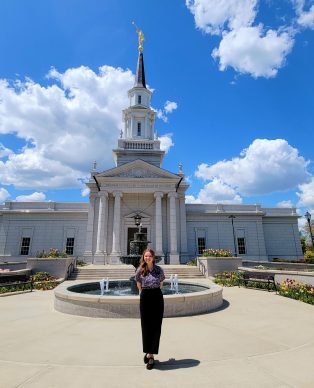
Sister Brynn Lee
Probably the most effective Facebook finding is prayer posts. Everybody wants prayers. You join a group page and type a quick note, “I want to pray for you, like/comment if you want me to pray for you.” We get a lot of responses from that. People are constantly saying, “Yes, I need prayers in this area.” It doesn’t matter what they believe. Everybody wants help from heaven. That opened my eyes. We meet people where they’re at. It’s really interesting to get into conversations with people about what they need, and they just open up to you because you’re willing to act and willing to pray for them.
SISTER ALEXANDER: I arrived in Boston in June 2021, so I’m still new. I was really nervous about what the dynamic would be here because COVID regulations for the Church and the missionaries were a lot stricter for much longer in New England than they were in Utah. The week before I got here, the Area Seventy and the mission leadership lifted a lot of the COVID restrictions. Before, the missionaries couldn’t leave the apartment at all without masks on, and that was lifted just before I got here. It was a tender mercy for me. We wear masks indoors, but don’t outside where we can be socially distanced.
What has it been like to teach discussions on video calls?
SISTER HANSEN: You hoped they’d log on. A lot of people flaked on us. It was a lot harder for them to keep that commitment, even though they were also in their home and didn’t have anything to do. It’s a lot easier to ignore a phone or Zoom call than if we knocked on their door and were actually at their house. We’re all guilty of that but we were easy to brush off. It did show people’s true colors more, but it was sad and frustrating.
Even when people did follow through, it was hard to teach and have a good conversation on Zoom because they tend to get distracted and it’s hard to stay focused. When you’re in someone’s home, you notice things like a family photo on the wall. It was harder to pick up on context clues and get to know them, and harder for them to feel the Spirit and give it priority. We didn’t have that in-person persuasion.
On a good note, I remember someone we had been calling for a while. We were finally able to have a Zoom meeting, and we were surprised by her appearance. We had pictured her so much differently. It was great to have the resource of the video calls because not seeing someone’s face changes everything. It was really cool having somewhat of a physical interaction with her – we could see and talk to her. We could build a more personal relationship and when church started again, we were able to get her going back to church.
SISTER LEE: Honestly, I think the hardest part of online lessons is many people don’t want to put on the camera. That’s hard. Just recently, we got someone to turn on the camera, and it was awesome.
As we transition into more in-person things, we have to be sensitive to how people are feeling on the other side of the screen, how comfortable they are because of the virus, what is okay to talk about. We don’t want to scare them away. That’s what we’ve been trying to navigate more.
Our current rule (as of August 2021) is that we can meet in person, in homes, which is very nice. Some people prefer that we wear a mask or stay outside. We do whatever that person is comfortable with.
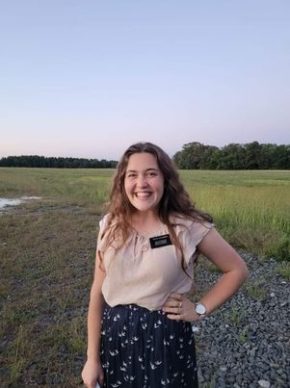
Sister Tressa Alexander
SISTER ALEXANDER: People at home ask if we’re having a hard time with all the technical stuff, but it feels normal. It feels normal to do a hybrid mission with the home MTC and a mix of online and in-person. Facebook work is really interesting. When I heard missionaries were using Facebook, I was skeptical. But I feel like the Lord has so much trust in us to use technology to propel the work forward and prepare the Kingdom of God. Cars and computers and all these different things are helping to move His work forward at an accelerated pace. Facebook is just another one of these tools.
I had no social media before the mission. Now I have social media and no wonder people waste so much time on this! You can scroll forever! So I have to keep a purpose in mind. Remembering our missionary purpose is important.
We’re still doing Facebook work, even though we can meet in person now. My MTC trainer taught the importance of not wasting time. Someone did a test: if you have thirty minutes because a lesson drops, it is more effective to do a social media post than to knock doors because more people will see it, more people will show interest with likes or comments, and you can just start talking to them online. They can see the post at any time.
The prophets and apostles have said that we’re not going back to the old way of doing things, let’s go forward and combine the best of both worlds. Someone described missionary work as being done with our right hand, but then our right hand was taken away and we had to use our left hand. Now that the right hand is coming back, we can still keep using the left.
I like what you said about social media having a purpose because it definitely is easy to scroll forever. What social platforms do you use as missionaries?
SISTER LEE: Right now in our mission, everyone uses Facebook, but a select few have been assigned to also use Instagram. I’ve heard that other missions use Tik-Tok, but not our mission right now. I see a mix of all ages on Facebook. I think a lot of young people join Facebook for the group activity. That’s what I’ve seen, and it seems pretty well-rounded.
Were you required to be vaccinated against COVID or did mission leaders give you the option?
SISTER HANSEN: The vaccines started while I was still in the mission, and the mission leaders said if we got vaccinated, we could have these certain benefits, but not have them if we did not. Toward my last few months, they said we could go to members’ homes if we were vaccinated, but if not, then no, and the district couldn’t meet in person. I hate to be the weak link and that’s what it felt like. I wasn’t a fan of that tactic – I didn’t think it was fair. But New England is very pro-vaccination. First question, people would ask straight out if we were vaccinated, and it changed their comfort level around us. It wasn’t necessarily required for missionaries, but if we didn’t, we still had restrictions.
I saw a social media post that reminded me we’re so blessed to have a prophet who’s a doctor during this time. It had a list of all the things that President Nelson has done about the pandemic. That’s when I started taking things seriously. The Church has been very on top of things with a lot of precautions, especially with the vaccine – the Prophet and the Apostles got it, so that made me feel a lot better about it, seeing their example. I was able to trust more. I didn’t understand what was going on, I didn’t like what was going on, but President Nelson was giving messages of hope. That really helped me pull through some of the harder times, knowing that the Church leaders have our backs, they’re watching out for us.
SISTER LEE: They said we could start taking our masks off at district council meetings if we got the shot. That’s when many missionaries did it – they wanted to take the masks off.
For missionaries who were assigned to other countries and are here on reassignment, this is a must if you want to go to the country of your call. Other countries won’t let anyone in without the vaccine. I want to go to the Philippines if that opportunity comes open. I feel so present here that sometimes I forget that my call is actually to the Philippines, even though I could still get a phone call that says I’m going tomorrow.
And I honestly trust our prophet. President Nelson got the vaccine. Even though I don’t know everything about it and I felt kind of pushed into it, I trust him. If he can get it, it’s not going to hurt me – I really did trust that. That was a big part of my decision. I had COVID before so I did have some crazy side effects from the vaccine but in the end, I’m grateful I got it.
What missionary work patterns are being brought back from pre-COVID, and what things are being dropped?
SISTER HANSEN: We took the basic things for granted, like just talking to people. When we got back to it, I’ll be honest – my social skills were off their game. I had a hard time just going up to someone and starting a conversation. We had to get back into the habit of talking with everyone.
The mission president said we will never knock doors again. I was surprised. That was one of the harder things – it was an unknown, you’d knock a ton of doors and have one person answer. Tracting is like the Facebook finding of regular mission work.
Toward the end of my mission, we were able to have both – in person interactions and social media messages. We had a bigger outreach. It was great when we had the hybrid schedule. We asked members to help us make videos, and they could post also. That was more relatable so there was more success with that. The social media – we created posts, sharing messages, we took that and brought it with meeting with people in person, and had a hybrid. It worked a lot better to have both.
SISTER LEE: For the best of both worlds, we’ll keep doing online video lessons because travel time takes a lot of your day. Remaining productive and using your time wisely – obviously, there’s a trade-off because in-person is best and it’s going to help that friend. But be prayerful about it so you’re maximizing your time and use that opportunity. We cover a lot of area. Try to be inspired about what to do instead of just following a set routine.
SISTER ALEXANDER: Our mission president said we’re not knocking doors. He said if we’re prayerfully pondering to visit this person, and they’re not there, then look at the surrounding doors. You’re in that area for a reason. God has put you there for a reason, so go and try. But knocking on every door on a street until someone opens – we’re not doing that anymore.
Every day, we are to go out with a purpose, have a plan, have a motive, and work with the Spirit. I was very struck by that. I think it is more personal because I’m going forth with that intention, and my all is with that person instead of just thinking, “Okay, I’m going to the next door.” I think it’s more ministering than trying to check a box for work done.
When have you made a plan and it changed?
SISTER ALEXANDER: When I first got to the area, I had a strong feeling that we needed to focus on people who are less-active. We were going to a teaching appointment and it was canceled when we were driving there, so we thought we would visit some less-active members. We decided to go to one member’s house and started driving there. Then I thought, “No, we need to go to this other sister’s house,” and Sister Lee said out loud, “We should visit this other person.” We both had the same idea. We drove to her house and I was nervous – we’d never met her before, never talked to her. And here we are, randomly knocking on her door without calling first. We just asked if we could talk to her and see how she was doing. We asked about her conversion story and she shared it, and at the end, she said, “I know you were inspired to come here because I was considering whether or not to go back to church.”
What do you want the entire world to know about being a missionary?
SISTER HANSEN: It’s one of the hardest things you’ll do but also one of the most rewarding. I’ve been home for about three months and when I look back, I see the good things. What really makes the mission special is the connections you can make. It’s really important to look at the positives. It’s hard sometimes and not always what you expect, but the missionary work is only going to go up from here. It’s so important to bring as many people as we can to the Savior.
I love that even though some of us have name tags, that’s not what makes you a missionary. A missionary is someone who invites others to come unto Christ, and all of us can be missionaries. I still share my testimony even though I’m no longer a missionary. I hope that’s something we learned from the pandemic – that we can all do missionary work, even though we don’t have a companion and an assigned area. It’s the connections we make with other people that make the difference. If we’re all of one heart and one mind in gathering Israel, we’re going to be a blessing, be a light in these darker times to people who don’t have that.
SISTER LEE: The Lord’s work moves forward, and it will move forward whether I’m a part of it or not. I want to be part of it. We can all be part of it, if we choose to. I love being part of it.
SISTER ALEXANDER: I believe that God’s work is moving forward. Every time something huge tries to get in the path to stop God’s work from growing, it doesn’t. There’s a scripture that says man will stretch forth his puny hand to stop the Missouri River in its course – nothing will stop God’s work.
Missionary work is so different. We’re not meeting in person at all, we’re staying at home. This seems like it would take a huge toll on the work. But it hasn’t. Instead, we’re finding these new, powerful, even more effective ways than before to move God’s work forward. Have faith that this is God’s church, this is God’s work. It’s going to move forward, no matter what.
At A Glance
Name: Jade Hansen
Age: 21
Location: MA-Boston Mission, December 2019 – June 2021; Home: Herriman, UT
Occupation: Hospital Orderly
Schools Attended: BYU
Favorite Hymn: Lord, I Would Follow Thee
Website or Social Media You Would Like Featured:: http://@jade_hansen18
Name: Brynn Lee
Age: 19
Location: MA-Boston Mission, January 2021 – June 2022; Home: Louisville KY
Education: BYU
Favorite Hymn: Come, Come, Ye Saints
Name: Tressa Alexander
Age: 19
Location: Location: MA-Boston Mission, June 2021 – December 2022; Home: Orem UT
Education: Utah Valley University
Favorite Hyman: Lead, Kindly Light
Interview Produced By: Trina Caudle
